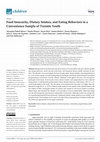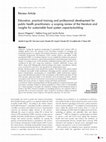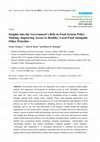Papers by Jessica Wegener
Journal of Human Nutrition and Dietetics

Children
Background: Food insecurity has been shown to be associated with poor dietary quality and eating ... more Background: Food insecurity has been shown to be associated with poor dietary quality and eating behaviors, which can have both short- and long-term adverse health outcomes in children. The objective was to investigate the food security status, dietary intakes, and eating behaviors in a convenience sample of youth participating in the Maple Leaf Sports Entertainment LaunchPad programming in downtown Toronto, Ontario. Methods: Youth aged 9–18 years were recruited to participate in the study. Food security status, dietary intakes, and eating behaviors were collected using parent- or self-reported questionnaires online. Results: Sixty-six youth (mean ± SD: 11.7 ± 1.9 years) participated in the study. The prevalence of household food insecurity was higher than the national average with at least one child under 18 years of age (27.7% vs. 16.2%). Dietary intake patterns were similar to the national trends with low intakes of fiber, inadequate intakes of calcium and vitamin D; and excess i...

There is increasing interest in linking food system policies and land use planning practices to h... more There is increasing interest in linking food system policies and land use planning practices to healthier diets and healthier communities. Little is known about the process of regional food system policy making or the impact of planning and policy decisions in shaping community food environments, including healthy retail opportunities. The Region of Waterloo's (ROW) Regional Official Plan (ROP) was adopted in 2009 and includes a progressive commitment to support the regional food system through actions to facilitate access to healthy, local food. The policies point to the multiple health, environmental, and local economic benefits of a strong and diverse regional food system and include efforts to: protect the Region's agricultural land; permit a full range of agriculture-and farm-related uses on agricultural land (to support farmer viability); provide a mix of uses, including food destinations, within close proximity to each other; permit temporary farmers' markets; and support community and rooftop gardens. The purpose of this research was to examine Waterloo Region's policy and planning environment as a case study for 'what works' with respect to potential points of intersection for improving public health goals and addressing other community priorities. This was achieved by obtaining multisectoral perspectives on the ROP's regional food policies, current food system planning practices at the local level, and access to food. The objectives of this research were: (1) to examine the process of food system policy making in Waterloo Region through multi-sectoral perspectives and to identify the key contextual factors, facilitators and barriers at the individual-, organizational-and system-levels; (2) to identify current planning policies and practices that affect the location, promotion and establishment of healthy retail outlets; (3) to describe the role and motivation of new and existing regional food system participants, including the Region's Public Health (PH) and Planning (RP) Departments and other key food system stakeholders, in contributing to food system change; and (4) to develop a conceptual framework to illustrate the process of food system policy making and features of food system change at the regional level. In-depth, semi-structured interviews (n=47) were conducted with regional decision makers (n=15); regional and local staff experts in public health and planning (n = 16); and regional food system stakeholders (n=16). Food system stakeholders included local food producers, retailers and distributors, and representatives from other levels of government and community interest iv groups. Participants were recruited primarily through expert and snowball sampling and a Project Advisory Committee (PAC) was established with academic experts and representatives from PH and RP to help guide early stages of recruitment and research. Two interview guides were used and adapted from earlier tobacco policy work in the Region. All interviews were audio-recorded and transcribed verbatim and constructivist grounded theory methods were used to code and identify emerging themes from the data. Key overarching themes and sub-themes related to food system policy making and food system change included: "strategic positioning" and its underlying sub-themes of "aligned agendas"; "issue framing" and "visioning" which emerged as important ways to influence and affect policy and environmental change. The significance of "local and historical context", "partnerships", "multi-sectoral participation" and "knowledge transfer" also contributed to an improved understanding of food system change in Waterloo Region. "Legitimacy" was noted to be a concern in the absence of an appropriate mandate to address food system issues however by engaging in "partnerships", one's ability to participate 'legitimately' in food system change improved. An important finding was that "food access" had different meanings to participants and may reflect the various lenses through which local food system concerns are viewed. A number of key facilitators of food system policy making were identified and included: food system champions; politically astute leaders; a common issue frame; a collaborative partnership between PH and RP; external partnerships with the community; and food-and agriculture policy networks. Several key barriers to food system policy making included: new areas of practice for PH and RP staff; limited capacity to act without committed partners; interjurisdictional relations and tensions with municipal planners; and dominant 'cheap food' values. Local-level barriers affecting healthy retail access related to gaps in regional food system coordination and legislative planning support and pointed to an important disconnect between the Region's vision for the regional food system and the current planning realities at the municipal level. Early signs of policy and environmental change to improve access to healthy food can be seen as evidence of PH's commitment, groundwork and capacity building efforts over the past decade and their strategic alignment with other regional priorities and partners. These findings can be used to support ongoing community planning considerations in Waterloo Region and to inform similar food policy and planning initiatives in other jurisdictions. v A G.E.N.E.R.A.T.E. Change Model was developed as an 8-Step guide for multi-sectoral collaboration and policy and environmental change at the regional level. Steps include: (1) 'grounding the work' (groundwork); (2) engaging multi-sectoral stakeholders; (3) negotiating positions and partnerships (establishing legitimacy); (4) exchanging knowledge (ideas and policy options); (5) recognizing points of intersection for policy and environmental change options; (6) aligning agendas, establishing a common issue frame, and setting a vision for change; (7) transferring expert knowledge to decision makers; and (8) evaluating policy and environmental change. At a time when there is mounting interest and consideration of possible food policy strategies at federal, provincial and regional-levels in Canada, findings from this research serve as an important example of how multiple cross-sectoral benefits can be achieved through coordinated and collaborative action. vi ACKNOWLEDGEMENTS Thesis writing is a lot like marathon running. I would never have been able to run this marathon without the support and guidance of my supervisor, Dr. Rhona Hanning. Thank you so much for giving me the freedom to pursue this exciting and emerging area of research and for your thoughtful feedback and suggestions along the way.

Canadian Journal of Dietetic Practice and Research, 2020
Little is known about athletes’ perceptions of emerging dietary guidance on plant-based diets (PB... more Little is known about athletes’ perceptions of emerging dietary guidance on plant-based diets (PBD). To explore knowledge and perceptions of PBD among competitive and recreational athletes, an online survey was developed, pilot tested, and sent via email to athletes recruited from 2 Canadian post-secondary institutions. Survey questions explored athletes’ understanding and views of the proposed Canadian dietary guidelines emphasizing plant-based proteins. Data were analyzed using grounded theory approaches. Forty-eight athletes participated in the survey. Two major themes emerged: (i) athletes had mixed perceptions of plant-based eating (PBE) and (ii) athletes associated PBE with broader food system concerns. Athletes have the potential to be important advocates of healthy and sustainable eating among peer groups and the general public. For effective promotion of PBE, the unique nutrient requirements and performance goals of athletes should be considered. Messaging to encourage a fl...
Journal of the Academy of Nutrition and Dietetics, 2018
PLOS ONE, 2019
Background Food insecurity undermines a patient's ability to follow diabetes self-management reco... more Background Food insecurity undermines a patient's ability to follow diabetes self-management recommendations. Care providers need strategies to direct their support of diabetes management among food insecure patients and families. Objective To identify what emerging practices health care providers can relay to patients or operationalize to best support diabetes self-management among food insecure adults and families. Eligibility criteria Food insecure populations with diabetes (type 1, type 2, prediabetes, gestational diabetes) and provided diabetes management practices specifically for food insecure populations. Only studies in English were considered. In total, 21 articles were reviewed.

Canadian Journal of Dietetic Practice and Research, 2018
Dietetic educators and practicum coordinators (PC) play critical roles in preparing students for ... more Dietetic educators and practicum coordinators (PC) play critical roles in preparing students for practice. Dietitians have made significant progress in the development of educational curricula, competencies, and other resources to support knowledge and skill attainment in public health. There are identified gaps in the literature concerning practical training in sustainable food systems and public health, creating barriers in knowledge exchange and improvements in practicum programs in Canada. This paper discusses the potential opportunities and challenges associated with the number of placements for practical training in public health based on interviews with PCs in Ontario. The findings are limited to the perspectives of 7 PCs with experience in practical training and are a starting point for ongoing evaluation. Identified opportunities within traditional and “emerging settings” for practical training in public health included: the uniqueness of the experience, the potential for s...

Public health nutrition, 2018
Noting the upstream positioning of sustainable food systems (SFS) to multiple global crises, the ... more Noting the upstream positioning of sustainable food systems (SFS) to multiple global crises, the present review described examples of emerging and promising practices to support SFS-oriented education, practical training (PT) and continuing professional development (CPD) among trainees and public health practitioners (PHP). A secondary objective was to compile the evidence into practical considerations for educators, supervising practitioners and professional associations. A scoping review of the literature published between 2007 and 2017 was conducted in May 2017 using four databases: CINAHL, MEDLINE, Scopus and HSSA, along with bibliography hand-searching and expert consultation. Articles were screened for relevance and specificity by independent raters. Nineteen articles were included for analysis. Two-thirds of the articles related to dietitians and public health nutritionists. Emerging practices included curriculum-based considerations, incorporation of 'sustainability'...

Abstract: Government actors have an important role to play in creating healthy public policies an... more Abstract: Government actors have an important role to play in creating healthy public policies and supportive environments to facilitate access to safe, affordable, nutritious food. The purpose of this research was to examine Waterloo Region (Ontario, Canada) as a case study for “what works ” with respect to facilitating access to healthy, local food through regional food system policy making. Policy and planning approaches were explored through multi-sectoral perspectives of: (a) the development and adoption of food policies as part of the comprehensive planning process; (b) barriers to food system planning; and (c) the role and motivation of the Region’s public health and planning departments in food system policy making. Forty-seven in-depth interviews with decision makers, experts in public health and planning, and local food system stakeholders provided rich insight into strategic government actions, as well as the local and historical context within which food system policies ...

Canadian journal of dietetic practice and research : a publication of Dietitians of Canada = Revue canadienne de la pratique et de la recherche en diététique : une publication des Diététistes du Canada, 2009
The web-based Food Behaviour Questionnaire (FBQ) includes a 24-hour diet recall, a food frequency... more The web-based Food Behaviour Questionnaire (FBQ) includes a 24-hour diet recall, a food frequency questionnaire, and questions addressing knowledge, attitudes, intentions, and food-related behaviours. The survey has been revised since it was developed and initially validated. The current study was designed to obtain qualitative feedback and to validate the FBQ diet recall. "Think aloud" techniques were used in cognitive interviews with dietitian experts (n=11) and grade six students (n=21). Multi-ethnic students (n=201) in grades six to eight at urban southern Ontario schools completed the FBQ and, subsequently, one-on-one diet recall interviews with trained dietitians. Food group and nutrient intakes were compared. Users provided positive feedback on the FBQ. Suggestions included adding more foods, more photos for portion estimation, and online student feedback. Energy and nutrient intakes were positively correlated between FBQ and dietitian interviews, overall and by gender and grade (all p<0.001). Intraclass correlation coefficients were ≥0.5 for energy and macro-nutrients, although the web-based survey underestimated energy (10.5%) and carbohydrate (-15.6%) intakes (p<0.05). Under-estimation of rice and pasta portions on the web accounted for 50% of this discrepancy. The FBQ is valid, relative to 24-hour recall interviews, for dietary assessment in diverse populations of Ontario children in grades six to eight.
Journal of Hunger & Environmental Nutrition, 2010
Over the last decade, there has been a notable increase in the number of “alternative” ways of ob... more Over the last decade, there has been a notable increase in the number of “alternative” ways of obtaining food in cities and communities. Alongside “mainstream” food stores like supermarkets and grocery stores, new “less conventional” retail outlets are emerging. To capture these food outlets as part of the built community nutrition environment, it is important to expand current concepts and
Journal of Hunger & Environmental Nutrition, 2012

International Journal of Environmental Research and Public Health, 2012
Government actors have an important role to play in creating healthy public policies and supporti... more Government actors have an important role to play in creating healthy public policies and supportive environments to facilitate access to safe, affordable, nutritious food. The purpose of this research was to examine Waterloo Region (Ontario, Canada) as a case study for "what works" with respect to facilitating access to healthy, local food through regional food system policy making. Policy and planning approaches were explored through multi-sectoral perspectives of: (a) the development and adoption of food policies as part of the comprehensive planning process; (b) barriers to food system planning; and (c) the role and motivation of the Region's public health and planning departments in food system policy making. Forty-seven in-depth interviews with decision makers, experts in public health and planning, and local food system stakeholders provided rich insight into strategic government actions, as well as the local and historical context within which food system policies were developed. Grounded theory methods were used to identify key overarching themes including: "strategic positioning", "partnerships" and "knowledge transfer" and related sub-themes ("aligned agendas", "issue framing", "visioning" and "legitimacy"). A conceptual framework to illustrate the process and features of food system policy making is presented and can be used as a starting point to engage multi-sectoral stakeholders in plans and actions to facilitate access to healthy food.

Canadian Journal of Dietetic Practice and Research, 2009
The web-based Food Behaviour Questionnaire (FBQ) includes a 24-hour diet recall, a food frequency... more The web-based Food Behaviour Questionnaire (FBQ) includes a 24-hour diet recall, a food frequency questionnaire, and questions addressing knowledge, attitudes, intentions, and food-related behaviours. The survey has been revised since it was developed and initially validated. The current study was designed to obtain qualitative feedback and to validate the FBQ diet recall. "Think aloud" techniques were used in cognitive interviews with dietitian experts (n=11) and grade six students (n=21). Multi-ethnic students (n=201) in grades six to eight at urban southern Ontario schools completed the FBQ and, subsequently, one-on-one diet recall interviews with trained dietitians. Food group and nutrient intakes were compared. Users provided positive feedback on the FBQ. Suggestions included adding more foods, more photos for portion estimation, and online student feedback. Energy and nutrient intakes were positively correlated between FBQ and dietitian interviews, overall and by gender and grade (all p<0.001). Intraclass correlation coefficients were ≥0.5 for energy and macro-nutrients, although the web-based survey underestimated energy (10.5%) and carbohydrate (-15.6%) intakes (p<0.05). Under-estimation of rice and pasta portions on the web accounted for 50% of this discrepancy. The FBQ is valid, relative to 24-hour recall interviews, for dietary assessment in diverse populations of Ontario children in grades six to eight.
Uploads
Papers by Jessica Wegener